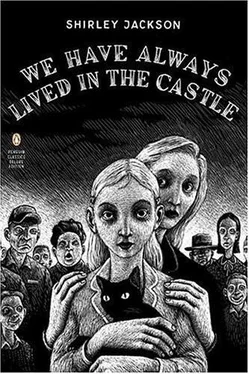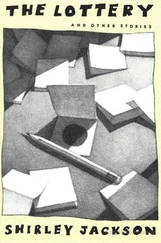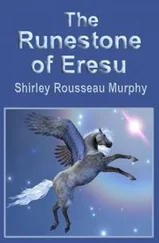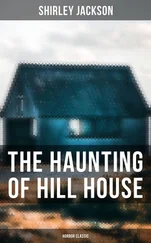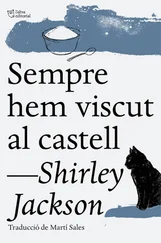Shirley Jackson - We Have Always Lived in the Castle
Здесь есть возможность читать онлайн «Shirley Jackson - We Have Always Lived in the Castle» весь текст электронной книги совершенно бесплатно (целиком полную версию без сокращений). В некоторых случаях можно слушать аудио, скачать через торрент в формате fb2 и присутствует краткое содержание. Город: New York, Год выпуска: 2006, ISBN: 2006, Издательство: Penguin Books, Жанр: Триллер, gothic_novel, на английском языке. Описание произведения, (предисловие) а так же отзывы посетителей доступны на портале библиотеки ЛибКат.
- Название:We Have Always Lived in the Castle
- Автор:
- Издательство:Penguin Books
- Жанр:
- Год:2006
- Город:New York
- ISBN:978-1-101-53065-8
- Рейтинг книги:3 / 5. Голосов: 1
-
Избранное:Добавить в избранное
- Отзывы:
-
Ваша оценка:
- 60
- 1
- 2
- 3
- 4
- 5
We Have Always Lived in the Castle: краткое содержание, описание и аннотация
Предлагаем к чтению аннотацию, описание, краткое содержание или предисловие (зависит от того, что написал сам автор книги «We Have Always Lived in the Castle»). Если вы не нашли необходимую информацию о книге — напишите в комментариях, мы постараемся отыскать её.
is a deliciously unsettling novel about a perverse, isolated, and possibly murderous family and the struggle that ensues when a cousin arrives at their estate.
We Have Always Lived in the Castle — читать онлайн бесплатно полную книгу (весь текст) целиком
Ниже представлен текст книги, разбитый по страницам. Система сохранения места последней прочитанной страницы, позволяет с удобством читать онлайн бесплатно книгу «We Have Always Lived in the Castle», без необходимости каждый раз заново искать на чём Вы остановились. Поставьте закладку, и сможете в любой момент перейти на страницу, на которой закончили чтение.
Интервал:
Закладка:
“Connie?” he called. “Hey, Connie? It’s Charles; I’m back.”
I looked at Constance and thought she had never seen Charles so truly before.
“Connie?”
She knew now that Charles was a ghost and a demon, one of the strangers.
“Let’s forget all that happened,” Charles said. He came close to the door and spoke pleasantly, with a little pleading tone. “Let’s be friends again.”
I could see his feet. One of them was tapping and tapping on the floor of our porch. “I don’t know what you’ve got against me,” he said, “and I’ve been waiting and waiting for you to let me know I could come back again. If I did anything to offend you, I’m really sorry.”
I wished Charles could see inside, could see us sitting on the floor on either side of the front door, listening to him and looking at his feet, while he talked beggingly to the door three feet above our heads.
“Open the door,” he said very softly. “Connie, will you open the door for me, for Cousin Charles?”
Constance looked up to where his face must be and smiled unpleasantly. I thought it must be a smile she had been saving for Charles if he ever came back again.
“I went to see old Julian’s grave this morning,” Charles said. “I came back to visit old Julian’s grave and to see you once more.” He waited a minute and then said with a little break in his voice, “I put a couple of flowers— you know—on the old fellow’s grave; he was a fine old guy, and he was always pretty good to me.”
Beyond Charles’ feet I saw the other man coming out from behind the car with his camera. “Look,” he called, “you’re wasting your breath. And I haven’t got all day.”
“Don’t you understand?” Charles had turned away from the door, but his voice still had the little break in it. “I’ve got to see her once more. I was the cause of it all.”
“What?”
“Why do you suppose two old maids shut themselves up in a house like this? God knows,” Charles said, “I didn’t mean it to turn out this way.”
I thought Constance was going to speak then, or at least laugh out loud, and I reached across and touched her arm, warning her to be quiet, but she did not turn her head to me.
“If I could just talk to her,” Charles said. “You can get some pictures of the house, anyway, with me standing here. Or knocking at the door; I could be knocking frantically at the door.”
“You could be stretched across the doorsill dying of a broken heart, for all of me,” the other man said. He went to the car and put his camera inside. “Waste of time.”
“And all that money. Connie,” Charles called loudly, “will you for heaven’s sake open that door?”
“You know,” the other man said from the car, “I’ll just bet you’re never going to see those silver dollars again.”
“Connie,” Charles said, “you don’t know what you’re doing to me; I never deserved to be treated like this. Please, Connie.”
“You want to walk back to town?” the other man said. He closed the car door.
Charles turned away from the door and then turned back. “All right, Connie,” he said, “this is it. If you let me go this time, you’ll never see me again. I mean it, Connie.”
“I’m leaving,” the other man said from the car.
“I mean it, Connie, I really do.” Charles started down the steps, talking over his shoulder. “Take a last look,” he said. “I’m going. One word could make me stay.”
I did not think he was going to go in time. I honestly did not know whether Constance was going to be able to contain herself until he got down the steps and safely into the car. “Goodbye, Connie,” he said from the foot of the steps and then turned away and went slowly toward the car. He looked for a minute as though he might wipe his eyes or blow his nose, but the other man said, “Hurry up, ” and Charles looked back once more, raised his hand sadly, and got into the car. Then Constance laughed, and I laughed, and for a minute I saw Charles in the car turn his head quickly, as though he had heard us laughing, but the car started, and drove off down the driveway, and we held each other in the dark hall and laughed, with the tears running down our cheeks and echoes of our laughter going up the ruined stairway to the sky.
“I am so happy,” Constance said at last, gasping. “Merricat, I am so happy.”
“I told you that you would like it on the moon.”
The Carringtons stopped their car in front of our house one Sunday after church and sat quietly in the car looking at our house, as though supposing that we would come out if there was anything the Carringtons could do for us. Sometimes I thought of the drawing room and the dining room, forever closed away, with our mother’s lovely broken things lying scattered, and the dust sifting gently down to cover them; we had new landmarks in the house, just as we had a new pattern for our days. The crooked, broken-off fragment which was all that was left of our lovely stairway was something we passed every day and came to know as intimately as we had once known the stairs themselves. The boards across the kitchen windows were ours, and part of our house, and we loved them. We were very happy, although Constance was always in terror lest one of our two cups should break, and one of us have to use a cup without a handle. We had our well-known and familiar places: our chairs at the table, and our beds, and our places beside the front door. Constance washed the red and white tablecloth and the shirts of Uncle Julian’s which she wore, and while they were hanging in the garden to dry I wore a tablecloth with a yellow border, which looked very handsome with my gold belt. Our mother’s old brown shoes were safely put away in my corner of the kitchen, since in the warm summer days I went barefoot like Jonas. Constance disliked picking many flowers, but there was always a bowl on the kitchen table with roses or daisies, although of course she never picked a rose from Uncle Julian’s rosebush.
I sometimes thought of my six blue marbles, but I was not allowed to go to the long field now, and I thought that perhaps my six blue marbles had been buried to protect a house which no longer existed and had no connection with the house where we lived now, and where we were very happy. My new magical safeguards were the lock on the front door, and the boards over the windows, and the barricades along the sides of the house. In the evenings sometimes we saw movement in the darkness on the lawn, and heard whispers.
“Don’t; the ladies might be watching.”
“You think they can see in the dark?”
“I heard they see everything that goes on.”
Then there might be laughter, drifting away into the warm darkness.
“They will soon be calling this Lover’s Lane,” Constance said.
“After Charles, no doubt.”
“The least Charles could have done,” Constance said, considering seriously, “was shoot himself through the head in the driveway.”
We learned, from listening, that all the strangers could see from outside, when they looked at all, was a great ruined structure overgrown with vines, barely recognizable as a house. It was the point halfway between the village and the highway, the middle spot on the path, and no one ever saw our eyes looking out through the vines.
“You can’t go on those steps,” the children warned each other; “if you do, the ladies will get you.”
Once a boy, dared by the others, stood at the foot of the steps facing the house, and shivered and almost cried and almost ran away, and then called out shakily, “Merricat, said Constance, would you like a cup of tea?” and then fled, followed by all the others. That night we found on the doorsill a basket of fresh eggs and a note reading, “He didn’t mean it, please.”
Читать дальшеИнтервал:
Закладка:
Похожие книги на «We Have Always Lived in the Castle»
Представляем Вашему вниманию похожие книги на «We Have Always Lived in the Castle» списком для выбора. Мы отобрали схожую по названию и смыслу литературу в надежде предоставить читателям больше вариантов отыскать новые, интересные, ещё непрочитанные произведения.
Обсуждение, отзывы о книге «We Have Always Lived in the Castle» и просто собственные мнения читателей. Оставьте ваши комментарии, напишите, что Вы думаете о произведении, его смысле или главных героях. Укажите что конкретно понравилось, а что нет, и почему Вы так считаете.
